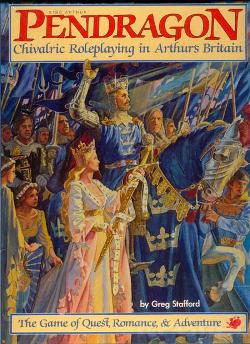I started to feel that I didn’t know roleplaying games well enough so I came up with the plan to read a roleplaying game corebook for every year they have been published. Selection criteria is whatever I find interesting.

Pendragon is one of the great classics of roleplaying. The characters are knights in the time of King Arthur, living through the events of Arthurian legend. The game has been designed to model different aspects of chivalrous romance, from tournaments to courtly love.
Indeed, I was impressed by the prominence of love in Pendragon. The game is resolutely based on legends of King Arthur and not actual history so knights are expected to swoon over chaste maidens they only glimpse from afar. I don’t remember reading many Eighties era roleplaying games where romance would have a similarly central position.
It’s funny how Pendragon manages to be both sentimental and unsentimental around the subject. To balance all the discussions of courtly love, there’s a random wife table, in case one of the knights gets married.
Much of Pendragon is built around opposing personality traits like Chaste/Lustful. Sometimes a player is required to roll a passion to see what the knight will do in a given situation instead of getting to make the choice themselves. There’s a funny example where a seductive Morgan le Fey threatens the chastity of a knight, who has to try to deflect from falling into her charms.
This is a departure from how the sex lives of player characters were understood in the early years of roleplaying. In D&D you sometimes see glimpses of the idea that player characters visit brothels to get laid. In Pendragon, sexually proactive women want to have sex with modest and unworldly knights.
Two of the more famous features of Pendragon are the inheritance system where characters grow old and are replaced by their heirs and the Pendragon Campaign. The latter is a mode of campaign play that takes the characters through the decades of King Arthur’s rule, covering three generations of player characters. The first edition of the game that I read covers both concepts only briefly, possibly because they were properly sketched out in the 1985 supplement The Pendragon Campaign.
I found Pendragon to be hugely inventive, clever and fresh even for a game that’s 35 years old. It seeks to transform a very specific kind of fiction, Arthurian stories of knightly romance, into roleplaying, inventing all kinds of cool systems and ideas in the process.
My favorite detail was a section that mentioned how Arthurian knights were very emotional, usually making big decisions on the basis of feelings like hate and love, and that players should do the same. This feels just wonderful to a character-based player like me.